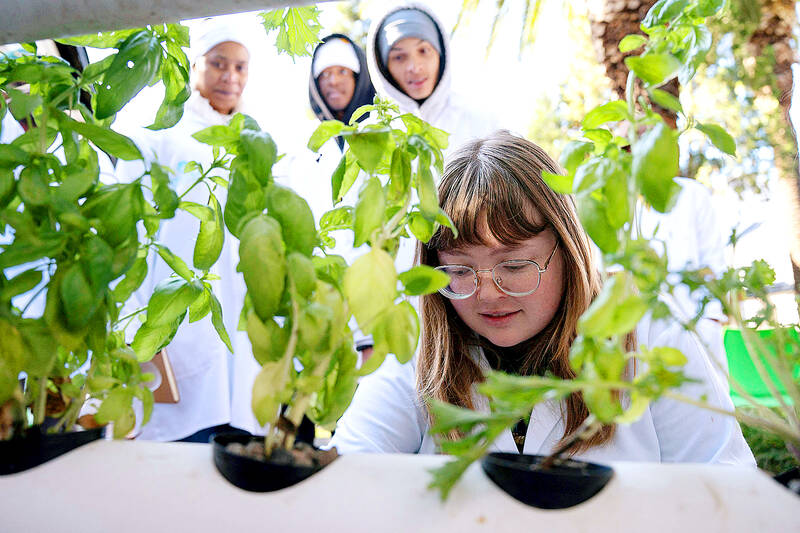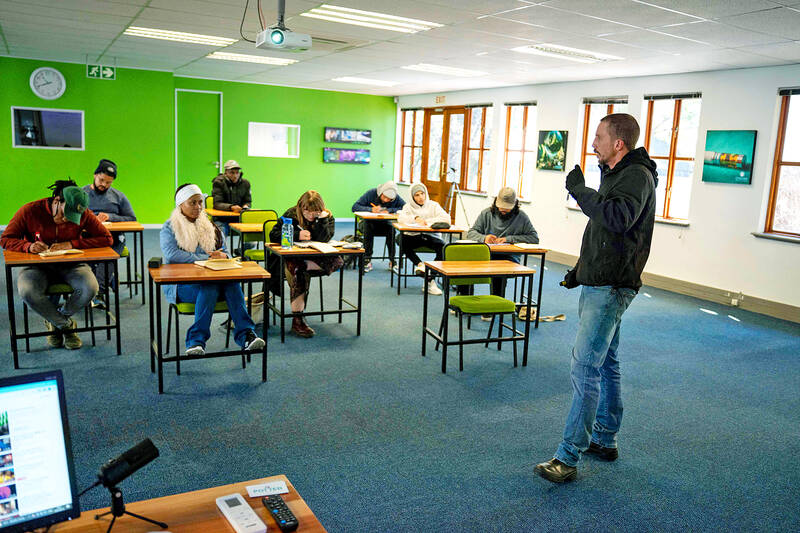In a leafy suburb of Johannesburg, green leaves adorn the walls of a school where students learn how to grow cannabis — but smoking pot is banned.
The teaching aims to dispel stigma around marijuana, said Linda Siboto, the cofounder of the institution, which styles itself as Africa’s first cannabis academy.
“It’s important for us to professionalize this industry and basically showcase that we’re not stoners with red eyes all the time talking about how great the weed is,” he said.

Photo: AFP
The academy is hoping to ride a global rethink of cannabis regulations.
From Spain to California, a growing number of governments are allowing people to light up.
In Africa, Lesotho approved cultivation of medicinal cannabis in 2017, paving the way for others such as Zimbabwe, Malawi and South Africa, which aspires to become a marijuana powerhouse.

Photo: AFP
South African President Cyril Ramaphosa last year said that cannabis has “huge potential” to draw investments and “create more than 130,000 new jobs,” a big pull in a country with an ailing economy and massive unemployment.
Named after a slang word for weed, the Cheeba Cannabis Academy is preparing students to partake in the expected bonanza.
“The industry, in order to develop, is going to need training and education,” Siboto, 42, said.
School days start with a yoga session, under a holistic approach, with subject matters including business, nutrition and futurism.
On a Thursday morning, about a dozen students sat at wooden desks before donning white coats to enter a laboratory at the back of the classroom. There Darian Jacobsen, a passionate cultivation teacher, showcased pruning techniques before moving on to some commonsense tips that learners write down in their notebooks.
“She’s not dead, sick or dying, she’s just a little thirsty,” Jacobsen, 28, said of a droopy-looking plant he takes out of an indoor grow tent.
The academy started offering online classes in 2020 before moving to its current premises last year. The flagship course lasts 12 weeks and costs about US$1,600.
The school has so far trained about 600 people and is hoping to get a boost from the government, which has announced grand, but so far sketchy, plans for cannabis.
South Africa’s top court decriminalized private and personal use of cannabis in a 2018 landmark ruling.
It tasked parliament with drawing up legislation, but that is overdue, creating “confusion” over exactly what is allowed, University of Cape Town researcher Simon Howell said.
Selling cannabis outside the medical realm remains a crime.
Cannabis clubs, a system where members pay to have their plants looked after, have sprung up across the country, but the legality of the concept is being tested in court. Meanwhile the government has issued hundreds of licenses to grow hemp and medical cannabis.
Even here, the industry is struggling to take off, analysts say.
In theory, South Africa has all it takes to become a major exporter.
Cannabis cultivation is a more than a century old tradition in parts of the country.
Costs are lower than in some competitors, such as Canada, as labor is relatively cheap, the weather is mild and the local currency comparatively weak.
“We have incredible sun here and lots of land, legacy growers and experience,” Cheeba cofounder Trenton Birch said.
Critics say the license system shuts out small farmers who have been growing cannabis illegally for decades, with starting costs of about US$1 million.
Many big growers are also having a hard time, pharmaceutical expert and cannabis entrepreneur Johann Slabber said.
They produce more than enough to cover local needs, but cannot export to Europe — the main target market — because their standards are too low and raising them often entails starting over from scratch, he said.
Out of almost 100 licensed farmers of medical cannabis, only five are currently exporting “on bulk scale,” he said.
The government has promised to streamline regulations to help the market to thrive.
Funding a manufacturing facility that buys yield from farmers, processes it up to European standards and exports it directly, could also work, Slabber said.
Still, despite the challenges, many are betting on the industry to succeed. The global cannabis market is expected to balloon to up to US$272 billion in 2028, various estimates show.
South Africa’s slice is forecast to soar to US$22 million in 2026, from US$5 million in 2021, market research agency Insight Survey said.
Expecting an increase in demand for specialized workers, other education providers have started operating alongside Cheeba.

CHIP WAR: Tariffs on Taiwanese chips would prompt companies to move their factories, but not necessarily to the US, unleashing a ‘global cross-sector tariff war’ US President Donald Trump would “shoot himself in the foot” if he follows through on his recent pledge to impose higher tariffs on Taiwanese and other foreign semiconductors entering the US, analysts said. Trump’s plans to raise tariffs on chips manufactured in Taiwan to as high as 100 percent would backfire, macroeconomist Henry Wu (吳嘉隆) said. He would “shoot himself in the foot,” Wu said on Saturday, as such economic measures would lead Taiwanese chip suppliers to pass on additional costs to their US clients and consumers, and ultimately cause another wave of inflation. Trump has claimed that Taiwan took up to

A start-up in Mexico is trying to help get a handle on one coastal city’s plastic waste problem by converting it into gasoline, diesel and other fuels. With less than 10 percent of the world’s plastics being recycled, Petgas’ idea is that rather than letting discarded plastic become waste, it can become productive again as fuel. Petgas developed a machine in the port city of Boca del Rio that uses pyrolysis, a thermodynamic process that heats plastics in the absence of oxygen, breaking it down to produce gasoline, diesel, kerosene, paraffin and coke. Petgas chief technology officer Carlos Parraguirre Diaz said that in

Japan intends to closely monitor the impact on its currency of US President Donald Trump’s new tariffs and is worried about the international fallout from the trade imposts, Japanese Minister of Finance Katsunobu Kato said. “We need to carefully see how the exchange rate and other factors will be affected and what form US monetary policy will take in the future,” Kato said yesterday in an interview with Fuji Television. Japan is very concerned about how the tariffs might impact the global economy, he added. Kato spoke as nations and firms brace for potential repercussions after Trump unleashed the first salvo of

SUPPORT: The government said it would help firms deal with supply disruptions, after Trump signed orders imposing tariffs of 25 percent on imports from Canada and Mexico The government pledged to help companies with operations in Mexico, such as iPhone assembler Hon Hai Precision Industry Co (鴻海精密), also known as Foxconn Technology Group (富士康科技集團), shift production lines and investment if needed to deal with higher US tariffs. The Ministry of Economic Affairs yesterday announced measures to help local firms cope with the US tariff increases on Canada, Mexico, China and other potential areas. The ministry said that it would establish an investment and trade service center in the US to help Taiwanese firms assess the investment environment in different US states, plan supply chain relocation strategies and